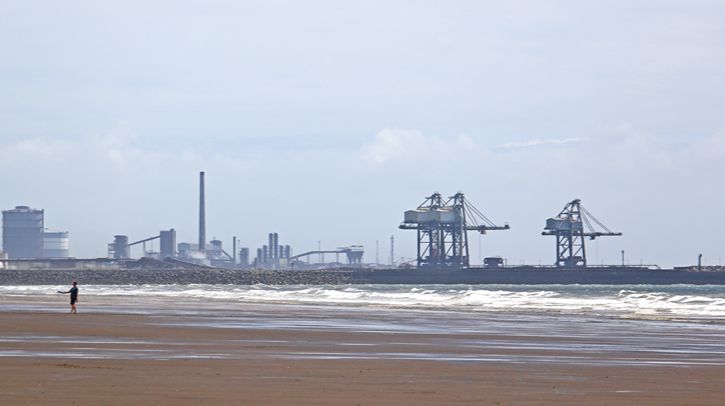Indian steel manufacturer Tata Steel has broken ground on a new £1.25bn (US$1.66bn) electric arc furnace (EAF) at the Port Talbot steelworks in Wales, backed by £500m (US$670m) grant from the UK government.
The start of construction on Tata Steel’s EAF project marks a step forward in Port Talbot’s transition to greener steel production and is expected to reduce the site’s carbon emissions by around 90%.
Steel produced at the Port Talbot facility supports the construction of sustainable marine vessels, including hybrid and low-emission ships, helping reduce Scope 3 emissions across the maritime value chain by providing low-carbon materials.
Government grant
The grant was provided as part of an improved deal for Port Talbot’s transition to greener steel production, which the UK government agreed after 10 weeks in office.
Business secretary Jonathan Reynolds joined Tata Group chairman N Chandrasekaran and Wales secretary Jo Stevens to break ground on the project last week. During the event, Reynolds toured the site of the new EAF, met with Tata Steel senior management and took part in a demonstration with a virtual reality headset to see how the new EAF will look when operational.
Tata Group’s Chandrasekaran said at the groundbreaking, “This is a proud day for Tata Group, Tata Steel and for the UK. Today’s (July 14) groundbreaking marks not just the beginning of a new EAF, but a new era for sustainable manufacturing in Britain. At Port Talbot, we are building the foundations of a cleaner, greener future, supporting jobs, driving innovation and demonstrating our commitment to responsible industry leadership. This project is also part of Tata Group’s wider investment in the UK, across steel, automotive and technology among others, which reflects our deep and enduring partnership with this country.”
Wales secretary Stevens said, “The UK government acted decisively to ensure that steelmaking in Port Talbot will continue for generations to come, backing Tata Steel with £500m [US$670m] to secure its future in the town, along with £80m [US$107m] to support workers and the wider community.
“Our Steel Strategy will also deliver up to £2.5bn [US$3.3bn] of investment to rebuild the UK industry, maintain jobs and drive growth. The construction of Tata’ s new furnace realizes the promise we made to the community, while the development of floating offshore wind, plans for a Celtic Freeport and millions more for local regeneration all mean that Port Talbot has a bright future.”
Local industry
The initiative is expected to secure 5,000 steel jobs. On July 14, industry minister Sarah Jones chaired a meeting of the Steel Council at 7Steel in Cardiff to work toward finalizing the government’s upcoming Steel Strategy – backed by up to £2.5bn (US$3.3bn) of investment – and “reflect on a series of recent wins for the industry with senior leaders from across the sector, including British Steel and UK Steel”, the government said in a statement.
These include slashing energy costs for steel producers via new measures announced in the UK’s modern Industrial Strategy, strengthening the UK’s steel safeguard measures to protect the industry from spikes of foreign steel imports and bolstering the UK’s procurement rules to ensure UK-made steel is considered wherever possible for use on public construction projects, the government said.
The UK government is also backing the steel sector by working closely with the USA to secure the removal of 25% tariffs on steel and aluminum, while the UK remains the only country in the world not to pay a 50% tariff rate.
Business secretary Reynolds said, “This is our Industrial Strategy in action and is great news for Welsh steelmaking backing this crucial Welsh industry, which will give certainty to local communities and thousands of local jobs for years to come. This government is committed to a bright future for our steel industry, which is why we provided £500m [US$670m] of funding to make this project possible. Our modern Industrial Strategy has set out how we’ll back the sector even further, including by slashing energy costs for firms like Tata Steel to level the playing field, as part of our Plan for Change.”
According to the UK government statement, the project – and Tata Group’s continued investment in British industry – is testament to the UK’s strong and valued relationship with India, following the trade deal the government agreed with India in May which will add billions to the UK economy going forward.
In related news, Mike Kane, the UK maritime minister, recently announced £30m (US$40m) funding to decarbonize shipping and power up the local economies of the UK’s coastal communities, during his visit to Clydeport in Glasgow. Read the full story here



